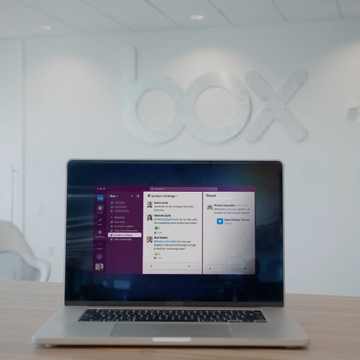For a company that is driven to change the way the world experiences property, it’s rather fitting that REA Group’s story started in a garage in the eastern suburbs of Melbourne back in 1995. Since then, the company has grown to 3,000 employees working across three continents with 16 brands under its umbrella.
Throughout its rapid growth, the company has stayed laser-focused on scaling its awesome culture. At the helm of this effort is Alana Shepherd, REA Group’s Executive Manager of People Agility. Her team’s mission is to make sure REA Group’s employees are set up for success and ready to tackle the future of work.
“Our tech team was the first adopters of the platform and saw great results, prompting us to scale it across the business,” says Shepherd.
“Today, Slack is used across all our teams. No matter your timezone, your role, or whether you’re working from home, in the office or on the road—Slack is the place where work happens at REA Group.”

“Instead of sending hundreds of emails or getting stuck in phone calls, I can spend one hour each week scheduling messages. This gives me back hours in my week that I can spend on more impactful work.”
Scaling culture across countries, brands and timezones
To say the last twenty-odd years have been busy for REA Group would be an understatement. Since 1995, the company has grown its employee base significantly, acquired new brands and built Australia’s most popular real estate website, with around 12 million visitors each month.
This momentous growth comes with significant challenges, says Shepherd.
“We had to face the challenge of fragmentation that comes with acquiring, merging and growing your business. As we’ve brought on new employees, we didn’t want a disconnected and disjointed system of communication,” she says.
“Slack has been a great unifier. It harmonises and centralises everyone around where the work gets done.”
And it’s not just internally. Slack has helped REA Group strengthen its relationships with external partners and vendors thanks to Slack Connect—which brings external collaboration out of inboxes and into channels.
For example, Shepherd and her team were recently working with external providers on building a strategic workforce planning approach.
“With Slack Connect, they can join the conversation. They’re able to become part of the fabric of REA Group and understand how we work,” says Shepherd.
“It also means we can get the work flowing faster.”
Making space for two-way conversations
For Shepherd, it’s important that REA Group’s employees can shape the company’s culture. As part of a project to refresh the company’s values, the HR team used Slack to collect and encourage employee input.
“Before Slack, we would have sent lots of emails with surveys and spent many hours and days trying to get feedback from our people. But with Slack, we simply share polls and our survey links on the right channels and we receive feedback within 24 hours,” says Shepherd.
Even better, the team is also collecting better quality feedback thanks to Slack.
“We saw employees commenting in threads, using emojis and video clips to engage directly in the conversation. We even get suggestions on how to improve our survey questions directly from our people. We would never have gotten that kind of in-depth feedback if we’d just sent out a bunch of emails.”
Another way Slack is helping REA Group scale engagement is through integrating with REA’s People Leader town halls. Previously, these were hosted quarterly on Zoom, and despite holding time for questions at the end of the meeting, Shepherd says that most of the follow-up conversation was happening on Slack.
To open up the lines of conversation with people leaders, REA Group created an ‘always on’ discussion in its #people-leaders channel.
“Previously, we would prepare for hours so we could anticipate questions for the town hall. Often, there wasn’t enough time to answer all the questions asked during the session,” says Shepherd.
“Since introducing an integrated conversation on Slack, we’re seeing better engagement and more questions asked and answered for our people leader community. Even better, the HR team doesn’t have to answer those questions, because other leaders are jumping in and helping directly.”
Slack has been a great unifier. It harmonises and centralises everyone around where the work gets done.
Boosting personal productivity
Cultural benefits aside, Slack has also been a boon for productivity.
Shepherd has also been able to save her employees time by using a Slack workflow to trigger asynchronous stand-ups.
“By automating our stand-ups, my team doesn’t have to sit in an hour-long meeting and go round the grounds. Everyone can share those updates in their own time.”
From a personal productivity perspective, Shepherd is a big fan of being able to schedule her messages.
“Instead of sending hundreds of emails or getting stuck in phone calls, I can spend one hour each week scheduling messages. This gives me back hours in my week that I can spend on more impactful work.”
Driving company culture from anywhere
REA Group is consistently recognised as a Great Place To Work. Slack has certainly played a role in this, says Shepherd. One feature she loves is the company’s channels—a central place to share ideas, make decisions and move work forward with a common purpose—where employees can engage and connect.
“One of my favourite channels is the #parents-channel. It’s a space for parents to connect, share tips, reach out and get support and feel like they are part of a community.”
Her team has also moved onboarding processes to Slack so that new-starters can feel welcomed and involved from day one.
“Without Slack, we wouldn’t be able to scale our culture and grow our team.”














